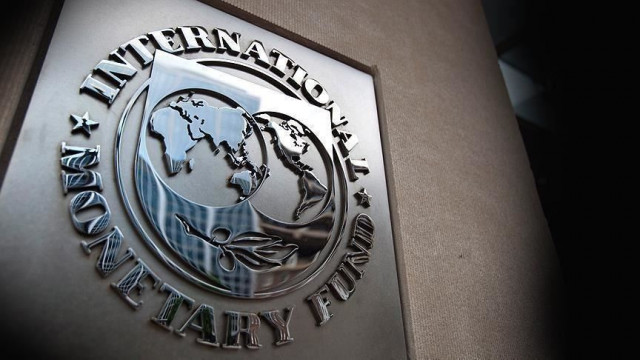Govt unlikely to achieve even revised, lower tax target: experts
May also be forced to withdraw sales tax exemptions on all but health-related items

PHOTO: ANADOLU AGENCY/FILE
The meeting between the country’s economists and the IMF took place amid final preparations for a mini-budget that is expected to be enforced before the IMF board meeting, subject to successful completion of ongoing talks.
Athanasios Arvanitis, the IMF Deputy Director for Middle East and Central Asia, met on Tuesday with a few Pakistani independent public policy experts. At least three leading economists and chartered accountants stayed away from the IMF meeting, sources told The Express Tribune.
The Federal Board of Revenue (FBR) has almost finalized the items that will be subject to increased sales tax and federal excise duties. Some of the items whose sales tax rates can be jacked up are pesticides, fertilizers, agriculture tractors and agriculture machinery.
The IMF has asked Pakistan to withdraw sales tax exemptions on all items except health-related ones. Some food items may also be subject to additional tax rates.
The federal excise duty on beverages and other items may also increase, which could further hurt their production.
The meeting with policy experts took place on the sidelines of the ongoing Pakistan-IMF policy talks that have entered a crucial phase. The talks are scheduled to conclude by Thursday if all goes well between both the parties.
The public policy experts urged the IMF not to pressure the government to bring the mini-budget at this stage, which, according to them, would further erode the political capital of the ruling party, one of the participants said on condition of anonymity.
They were of the opinion that the government was not in a position to meet even the downward revised tax collection target of Rs5.238 trillion, which still requires 37% growth over last year’s collection. The FBR has already faced a Rs385 billion shortfall in tax collection in seven months.
While responding to the independent experts’ suggestion, the sources said, Athanasios Arvanitis was of the view that Pakistan’s 12% tax-to-GDP ratio was very low and there was a need to increase it to make room for expenditures.
The sources said that the IMF team leader was also inquisitive whether the government can actually deliver any relief to the consumers through targeted interventions. The federal cabinet on Tuesday approved a relief package for people to offset impact of nine-year high inflation.
The IMF has demanded that Rs200 billion in additional taxes be levied to minimize the gap, as it is not convinced that the tax shortfall can be fully offset with non-tax revenues, the sources in the Finance Ministry said. They added the IMF was looking for sustainable long-term revenue generation measures.
Arvanitis has also expressed similar views during his interaction with Advisor to Prime Minister on Finance Dr Abdul Hafeez Shaikh.
The FBR’s tax to GDP ratio was just 9.9% of the GDP at end of last fiscal year, which the IMF wants to increase to 12.6% of the GDP in this fiscal year and to 15.1% by end of the IMF programme.
The PTI government has already slapped Rs735 billion additional taxes in June last year, which heavily contributed to double-digit inflation along with steep currency devaluation.
Although former finance minister Dr Hafiz Pasha skipped the IMF meeting, he, through an article in an English language daily, suggested to the IMF to relax the tax-to-GDP condition.
The FBR has claimed that it achieved 17% growth in collection during the July-January period but former special assistant to PM on Revenue Haroon Akhtar Khan told Prime Minister Imran Khan on Monday that the claim was not true.
The sources said that Khan plainly told the PM that the claimed 17% growth was the result of blocked tax refunds and taking huge income tax advances from the taxpayers.
The FBR is currently working without a full-time chairman as Shabbar Zaidi is on medical leave. The government is in process of finalizing a new FBR chairman and Tariq Pasha, the Secretary Kashmir Affairs and former FBR chairman, has emerged as the front-runner for the position.
But Pasha is set to retire on July 20th.
The independent policy experts also advised the IMF team to lower the interest rates which, according to them, has significantly increased the debt servicing cost of the government. Over three-fourths of the projected FBR tax collection would be consumed in just paying the debt servicing cost.
However, the IMF deputy director did not give a detailed response to the suggestion and instead said that he would consider it during a meeting with the State Bank of Pakistan at the weekend, said the sources.
The experts also asked the IMF to improve its communication strategy, saying that the adverse implications of the IMF programme were bringing a bad name to both the government and the IMF.
They also asked the IMF to relax monetary tightening and import controls aimed at providing some impetus to economic growth, the sources said. Pakistan has met net international reserves and currency swap reduction targets, which can also be used as leverage.
The public policy experts said that the fiscal consolidation under the IMF programme will make it difficult to achieve the sustainable development goals, which in turn will increase poverty in the country.
The experts also raised the issue of setting high targets while ignoring the country’s weak institutional capacity.



















COMMENTS
Comments are moderated and generally will be posted if they are on-topic and not abusive.
For more information, please see our Comments FAQ